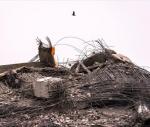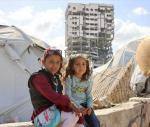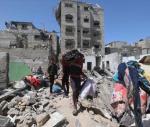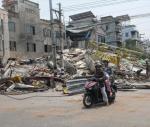You are here
‘Let there be no more empty words’
Mar 01,2018 - Last updated at Mar 02,2018
Over the past week, we have witnessed some of the Syrian conflict’s worst days of violence. Since the start of the government’s aerial bombardment campaign of the rebel-held suburb of eastern Ghouta on February 18, over 500 civilians, including 121 children, have lost their lives. A collective feeling of utter despair and helplessness engulfs the Jordanian people who, over the years, have taken in approximately 1.3 million Syrian refugees, 660,000 of whom are registered. Day after day, we feel the pain and rage of innocent civilians caught up in this conflict, sitting as we are, only a few hundred miles away from the atrocities, but unable to help bring peace to our neighbours.
As the Founder and Chairman of the West Asia-North Africa Institute, one of the leading independent non-profit policy think tanks in the region created to bring together regional stakeholders to address the social, environmental and economic issues facing the peoples of this region, I am in daily contact with a wide range of people. Never have I sensed such shared despair among Jordanians, and other Arab and international friends as we witnessed the events unfold this past week. UNICEF’s symbolic blank statement because "no words will do justice to the children killed", released on Tuesday February 20, has my full support and deepest respect. Words have done nothing over the years to end the suffering in Syria. We just sit and hope and feel the shame of doing nothing.
Amidst a cacophony of special interest and proxy wars, we have become indifferent to the statistics, to the rising death toll of nearly half a million and the number of eleven million displaced persons. This is the worst humanitarian crisis of our time. What must never be forgotten are the basic human rights and fundamental freedoms. State authorities have been granted the honour and responsibility to uphold all the standards of human dignity, to protect and lead their people, and must be held accountable for this to the highest degree.
The myriad of state and non-state actors active in this war has made it difficult to imagine the prospect of negotiated peace in Syria. The self-interest of regional and world powers in this conflict appears past the point of retraction, and so I will assert that it is imperative for the global community to recognise that political priority should, and will no longer, take precedence over human dignity.
For many years, I have spoken about the importance of human dignity where each of us is no more, but also no less, than a human being. We must take a long-term view of human welfare, and identify a clear set of values common to all humans, such as access to justice, education, property, water and employment. Too often, the solutions to urgent problems are military or hard security, and relying on violence to resolve itself is not enough. Jordan, a country directly affected by the consequences of war, will continue to support the delivery of country-led response plans, as demonstrated through the United Nation Office for the Coordination of Humanitarian Affairs' Jordan Humanitarian Fund, and mobilise alongside the international community to support the 13.1 million Syrians who require humanitarian assistance as a result of the ensuing violence.
In full support of UNICEF’s statement, let there be no more empty words. Instead, I urge the global community to focus on a blueprint for action, with the principles of human dignity at its core, in order to bring an end to this conflict.
The writer, Prince Hassan, is Founder and Chairman of the West Asia-North Africa Institute (WANA)















